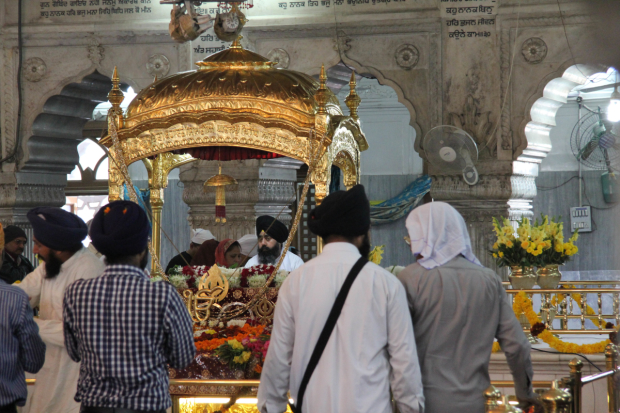Why can't theatres be sacred places?

(© CC BY 2.0/Hari Singh)
Theatre and religion have always been interlinked. Performance is at the heart of worship, from its rituals to its devotionals, while theatre has its roots in faith. Ancient Greece had its Dionysian festivals, medieval England, its mystery plays. Here in India, theatre as a whole is believed to be a divine creation, the fundamentals of dramaturgy having been passed down from Lord Brahma.
In Britain, comparisons with religion tend to look towards Christianity. The critic Andrew Haydon has suggested that, in an increasingly secular society, our theatres might aspire to the function of cathedrals, not least in their architecture. They're set up for congregations, all facing one way, the stage as its altar. Plays become parables; performances, sermons. We talk, as in the Eucharist, of gift and receipt.
India is a pluralistic society, where all manner of faiths intermingle – Hinduism, Islam and Sikhism predominately – and it's been instructive to see society and spaces organised according to different religious principles.
In the dust of Dehli's old town, street hawkers shout over one another. What pavements there are are rammed with pedestrians, who squeeze in as the traffic passes. Tuk-tuks splutter past, kicking up red dust. Stray dogs sniff this way and that. Cows have right of way.
To be sacred is to be set apart, and I sometimes wish that theatres could achieve something similar
Off this road, hectic as anything, there's a Sikh temple, a significant one too: the Gurdwara Sis Ganj Sahib, supposedly the spot where Guru Tegh Bahadur, the ninth of ten, was beheaded. You'd never know it from street level. But for a shallow foot pool out front, the temple looks like any other building.
Step inside, however, washing your feet on the way in, and you find another world entirely. Instead of the earthy red-brown coating everything outside, the space shimmers silver and gold. It's larger than seems possible, a long rectangular hall, and rather than cacophony, the room's filled with a recurring line of chanted song. Three musicians sit cross-legged and play kirtan. People are suddenly still. So is the air, cooler now and cleaner. It's not calm exactly, but concentrated, intent, sacred.
To be sacred is to be set apart, and I sometimes wish that theatres could achieve something similar. The best shows can make the whole world disappear; they pull you in so fully that you forget everything else. How might theatres, as buildings, be more conducive to that? More concentrated and otherworldly? Instead we have box offices and bookshops and cafe-bars – all continuations of the world outside. Interval ice-creams intrude on the auditoria, even, in a sense, the show. Every rogue ringtone does the same. It cracks the space open.
Could we do more to demarcate that space? Or would that create a barrier to access? It needn't. The Gurdwara Sis Ganj Sahib isn't just open to all, from dusk until dawn, it actively welcomes non-Sikhs. Every day a community kitchen, staffed by volunteers, serves free meals to anyone who steps inside, regardless of faith. What if a theatre served a similar function in its society: an open-house with a real role to play.
At the same time, part of me wants the opposite – theatre not as distinct, at one remove from life, but as woven into it entirely.
Hindu temples are scattered throughout society. Almost every street corner has a small temple; every other roundabout, an idol garlanded with marigolds. It's as true in heaving cities as it is of lowly rural villages. Motorways are dotted with roadside shrines. Family homes too. Holy men totter here and there, dishing out blessings – living temples.
Could we find a similar space for performance in our society?
The effect is to interface faith into life completely. Pass a temple or a shrine and people stop by, if only momentarily, touching the first step and offering a quick devotional. Idols adorn every shop counter and godly stickers cover taxi windscreens. One alley is tiled with deities – Vishnu, Shiva, Brahma. Before they went up, it was used as a makeshift urinal. Now there's a reminder that the gods are watching. Faith is in everything.
Could we find a similar space for performance in our society? Perhaps, with the rich artist-in-residence schemes or rep companies. Rather than five act dramas, we might find a more molecular approach: installations, one-on-one encounters, street shows. Maybe, as I looked at last week, the answer lies online: flood the stream with performance; make it an everyday occurrence.
There's the key: everyday, always. These points of worship are round-the-clock operations: durations, almost. Unlike Christian services, they don't have start and finish times – curtain up, curtain down. Organisation depends on the individual, and I can't help but feel that theatre might benefit from adopting similar principles.










